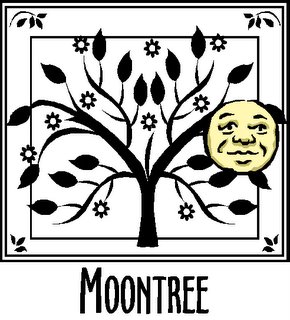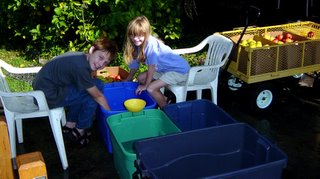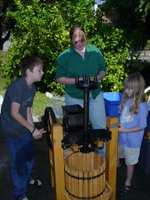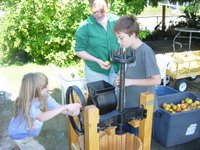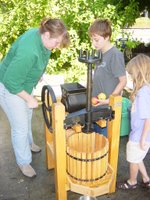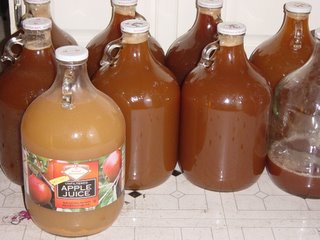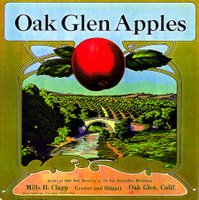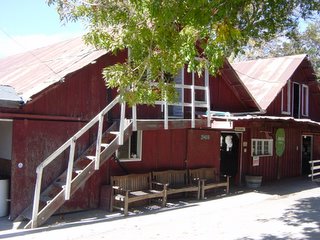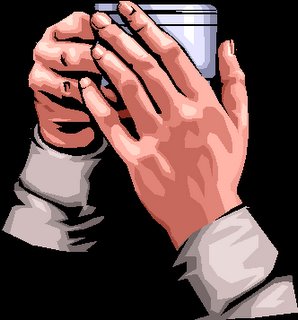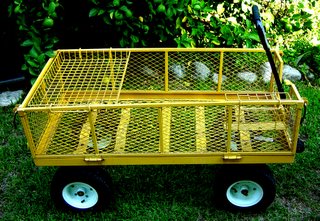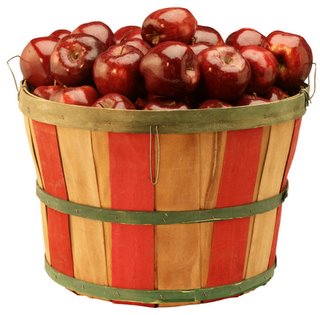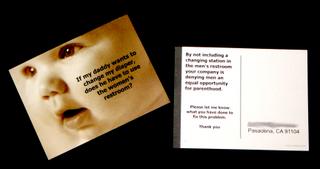 T
Today I drank a sustainably grown, organic, fair trade, sustainably
ground and sanely
brewed cup of gourmet coffee.
I think I may have saved an entire square meter of polar ice from premature melt all by myself.
A combination of comments on other blogs -- both by me and other bloggers -- lead to this simultaneously cool and revolting turn of events.
First, playing me-too to
GreenLaGirl's Starbucks Challenge reawakened my awareness of Fair Trade certified coffee and the value in not turning to an exploitative commodity for my middle-class American daily coffee fix. Indeed,

because of the zealousness with which I joined the challenge game, GLG and CityHippy rewarded me with a package of
Monkey & Son fair trade certified, organic certified, whole bean coffee.
This was very cool, because I had exchanged emails with the Monkey and had meant to come try a sample, but never did. Of course, as good coffee should, this arrived as whole bean coffee, which left a new dilema -- how to render it brewable.
Next, since the cool prize arrived last week, just at the height of pre-solstice/Christmas madness, it sat a few days to be admired -- and pondered -- as I set about finding a way to grind it. (We grind ours at the store, usually, and use it in a few days.)
I considering digging out the electric "spice mill and coffee grinder" I'd had for years, but I could hear the echo of some forgotten coffee gourmet scoffing about "chopped coffee" versus truly "ground" coffee, and the distinct superiority of the latter. Since my "spice mill" was, clearly, a simple whirling blade in a container, I could not, as my first choice,
lower myself to drink chopped coffee. My second choice, the use of the amusing "magic bullet" mini-blender received as a wedding gift was no better. Another classless bean chopper!
(As an aside, the Bullet makes a sublime, quick, smoothie out of frozen fruit, milk and honey. A smoothie is just viciously chopped fruit and ice and does not need to be ground.)
Then, of course, I had been blogging over on
Easy Green about
electric appliances and how some were excessively juice-eating when a non-electric alternative was usually available. There was another strike against both mill and bullet.
Then I remembered that I had a hand-cranked coffee
grinder from my Stepmother's recent return to her native England, a heavy, hand cranked iron device, that slowly slid the beans down a giant screw until each bean was pressed between counter-rotating ribbed steal plates, to emerge as lovely, truly
ground coffee on the bottom.
Now this was
not one of those dorky decorative faux antique coffee mills. This was the real deal, a serious kitchen tool, with three bolt-holes to bolt it to the wall for heavy duty and daily use, or a removable clamp to temporarily screw it down to the table top.
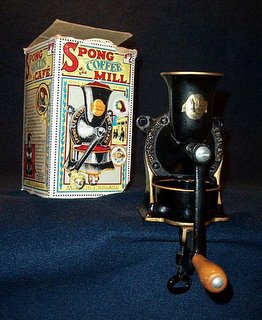
Just for fun, I went on the web to find a cool picture and discovered that these mills are coveted and ebayed like crazy -- in Australia and New Zealand (!) and the following additional history, according to the folks at
www.coffeehouseinc.com:
"James Osborne Spong started a small family business in 1856 in London, England to make economic household utensils. His coffee grinders have changed design very little since the beginning as he found no improvements necessary."Mine appears to be from modern production, due to having a red plastic hand grip not wood, but otherwise looks pretty well identical to the one shown here. There is a LOT of interesting
coffee mill and coffee history at this collectors' site.
In any case, I clamped the ol' Spong Mill to the table, filled it with beans, and "gave the crank a whickity wank" as the song says.
Et viola,
hand-ground, Fair Trade, Organic coffee.
Not only
actually ground, but ground without all that coal-based electricity they sell us here in Pasadena. (And who wants
coal-based electricity in their coffee, hmmm?)

The next amusing coincidence came about in that my In-Laws gave me my very own French press for Christmas. Mom-I.L. had been reading this space or the
SBX, Fairtrade & Me blog about my adventures trying to get French pressed coffee. Now, all that time I was
not looking for French Pressed coffee per se -- it seems too strong to me when the Starbucks crowed makes it -- rather I was looking for the right answer on their
willingness to press Fair Trade coffee, without prompting.
Still, truth be told, I
had wanted a French press for
home, but could not justify it with a new-ish Mr. Coffee gleaming on the counter top.
Still, too, back at
Easy Green, I had griped particularly that my
plain Mr. Coffee draws 900 watts of power, sucking up some 1.8 kWh when left idling for the preset auto-warm designation. Now, once again I say, who wants coal-fired coffee?
I was also feeling a little guilty that
ArdentEden gave me part credit for causing her to feel terrible guilt when she used her coffee maker, yet I had not yet given up my own electricity-sucking devil even as I had named it demon.
Unfortunately for us, most of our electricity falls from the sky, and is sustainably grabbed up by our solar cells. The rest, if there is any that the sun doesn't supply, comes from
Green Power, which in this case is wind-generated power supplied by the city.
So sometimes I feel we can afford to be a little cavalier in our use of electricity, what with most falling, free, from the sun and the rest coming cleanly from the wind. But since we want to try to come in at 100% solar, net for the year by April 7, and we have added both forced-air heat and central air conditioning since the solar install, I'll take the potential 300 or so kWh a daily cup of coffee would cost and save it, thank you.
So, out comes the the cool new French press.
Of course, I still boiled the water on a gas stove -- I joked that I was going to boil the water by burning recycled paper grocery sacks, but nobody laughed. At first I thought it might have been that I was being ridiculous because the gas stove was perfectly workable; now I'm not sure that I didn't get a polite laugh because it was obvious that the green house gases and particulate matter generated by a grocery bag fire would be far worse than burning a little natural gas. Sigh. Like anything, fundamentalism just leads to absurdities.
But there it is, Ladies and Gentlemen: The Sustainable Cup of Coffee (more or less).
Fair Trade, Organic, Hand Ground, French Press brewed. With just a nibble of Trader Joe's Fair Trade, Organic
extra dark chocolate on the side. Mmmmm mmmm. Good Monkey.
The coffee itself: Next Entry.
Wherein we wonder why all FT coffee we have tasted so far has similar bright overtones, but not the deep, rich mellowness of say the TJ house brand Organic . . . curiouser and curiouser!
 Auld Lang Syne
Auld Lang Syne
















